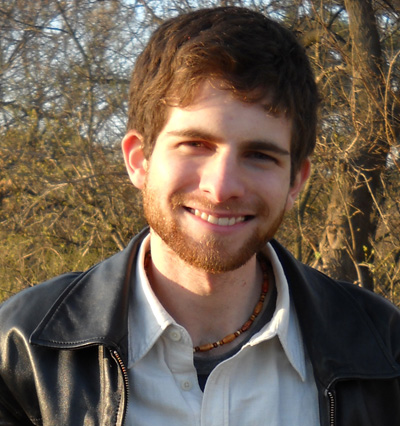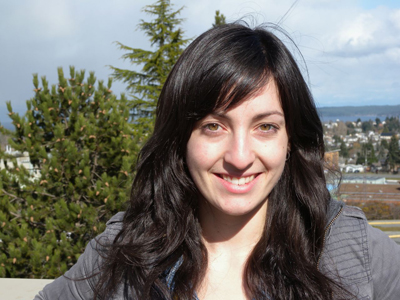Interviews
I Followed the Voice:
Melanie Godel in Conversation with
Daniel Karasik
 Daniel Karasik talks with Malahat intern Melanie Godel about "Witness" (#176, Fall 2011), winner of our 2012 Jack Hodgins Founders' Award.
Daniel Karasik talks with Malahat intern Melanie Godel about "Witness" (#176, Fall 2011), winner of our 2012 Jack Hodgins Founders' Award.Our very first impression of the narrator is his anxiety about success—his realization that he will never publish a novel. Is this something you relate to?
Definitely. I do worry that I’ll never publish a novel, not because I think novel-publishing is necessarily an ultimate act but because it’s something I’ve long desired and worked for, and I hate to think that all that desire won’t issue in anything meaningful. That’s the real fear, in my life and in the story. That desire will prove fruitless. The novel-publishing question is just a way into that, one that’s consonant with the story’s thematic bass notes about witnessing and responsibility.
The narrator makes a lot of connections with strangers over the course of the bizarre several hours—the dog, the horse, the girl in the jail. What is it about being wrenched from the ordinary that seems to allow for greater clarity?
I’m not sure I can really identify, in my own experience of the world, an “ordinary” to be wrenched from. Life seems relentlessly extraordinary to me, and I don’t mean that only in a reverent or even an enthusiastic sense (though I’m all for reverence and enthusiasm). Nor do I feel I ever have much clarity. Often I think I do, but I’m usually proven wrong. So I don’t see a huge disjuncture between my life and the strangenesses of “Witness,” unlikely as that may sound. The events of the story have a symbolic intensity that isn’t lifelike—the story isn’t strictly “realistic”—but as I wrote it, I found its narrative logic just as easily intuited, just as familiar as if I’d drawn it directly from experience. Mostly I followed the voice, which made me laugh. Around the time I started “Witness,” I remember asking myself what I would write if I were convinced nobody else would ever see the result, if the entire justification for the work had to consist in the delight and discovery of its creation. I should mention that this approach led to ridiculous excesses. The first draft of “Witness,” completed almost five years ago, was more than 20,000 words long. It seemed unlikely that it would ever find its way into print; probably it never would’ve had I not been ruthless in my editing. I still count myself very lucky that it found sympathetic readers at The Malahat, let alone that it’s now been recognized with this lovely award.
You play with our senses in this piece. The first half is almost completely devoid of sound; the second half, you plunge us into darkness. Why do you think this deprivation of a sense amplifies the sense of longing?
Well, so much of what I find good in the world is sensual, or has its roots in the senses, that the deprivation of any of them seems to me a real calamity. And there’s also terror in darkness, and in perfect silence. That sense-deprivation you describe also intensifies the meditative quality of the story, I think. The narrator feels so much and yet is so stuck in his head, so inward-turned, and this is part of his alienation, his problem.
There isn’t a great deal of dialogue. Was this a conscious decision to separate your playwriting from your prose?
Not at all, actually. I often write very dialogue-driven fiction. And “Witness” is a monologue as much as anything. Or a dialogue in which one party really rambles on and the other is a dog. It’s voice-driven, much the way my playwriting is. Not that I think voice is an end in itself; a striking literary voice that isn’t in pursuit of something—the unravelling of an essential question, the revelation of a distinct emotional truth—isn’t very interesting to me. But I believe that voice can lead to those things.
You’ve named the big black dog Othello. Do you often draw from your theatrical background to add depth to a story?
There are many symbols in “Witness,” but I must admit that Othello the dog isn’t one of them. I named him that because he’s black. Is that terrible?
You seem to be deeply involved in both the writing and performing aspects of the arts. Though it’s not as life-altering a choice as “being the murderous riders [or] the murdered horse,” if you could only choose one, which would it be?
Writing. It’s by far the deeper need, the stronger compulsion for me. Then again, it’s a desk job. Particularly when rewriting, I can stare at my computer screen for 12, 14 hours at a stretch, and that just seems obviously unhealthy. It’s a sedentary, isolating occupation, whereas performing offers both physicality and community. I like a balance between the two. But if I had to choose, no question. Writing.

Melanie Godel









